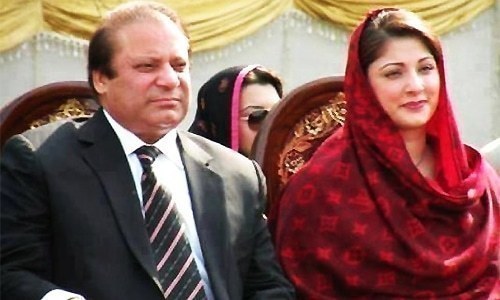THE law permits it, humanity demands it, but the accountability court is unmoved. The denial is wrong and shameful.
Former prime minister Nawaz Sharif and his daughter Maryam Nawaz are in the UK to visit a visibly ailing Kulsoom Nawaz, wife and mother respectively to the Sharif duo on trial. With Kulsoom Nawaz’s medical condition clearly serious, Mr Sharif and his daughter requested the accountability court for a weeklong exemption in personal appearances during the near-daily hearings. On Saturday, the accountability court denied the request, though it allowed a one-day exemption with the possibility of the Sharifs seeking a further exemption in case of a medical emergency.
According to media reports, Mr Sharif may return to Pakistan rather than file another request for an exemption to avoid an impression that he is seeking to flee into exile. The unnecessary position Mr Sharif has been put in by the accountability court is deeply regretful.
To be very clear, no one is above the law and powerful figures should not expect special treatment by the courts. But the law is compassionate and recognises that special circumstances can exist.
The cancer treatment that Kulsoom Nawaz is receiving in the UK manifestly fits the circumstances in which Mr Sharif can be granted an exemption in personal appearances before the accountability court for a period of time. Mr Sharif has for months complied with the court’s orders and diligently attended the accountability hearings. The political rallies he has held across the country have helped underline that he intends to help, if not lead, the PML-N campaign in the upcoming general election.
The former prime minister has spoken plainly about his expectation of being sent to jail. Perhaps most relevantly, Mr Sharif sought only a one-week exemption from the court. By next Friday, Mr Sharif would have been required to be back in Pakistan in any case. What, then, is the accountability court concerned about or afraid of?
In decades past, the Sharifs have victimised and been victimised by their political opponents.
In the 1990s, Benazir Bhutto was famously forced to visit her husband, Asif Zardari, in jail with their young children in tow. The bitterness from that era eventually led to a bipartisan political understanding that new and better norms of democracy had to be established. Targeting families and using family circumstances to heap political pressure on an opponent were tactics that should have been left in the past.
To some extent, at least among politicians, those new norms have held. The Model Town killings are a black mark, but successive governments at the centre have withstood dharnas and long marches. There have been no major political prisoners put in jail by politicians themselves.
Mr Sharif is a three-term prime minister. He deserves the respect to be allowed to be with his wife at this time.
Published in Dawn, April 22nd, 2018












































